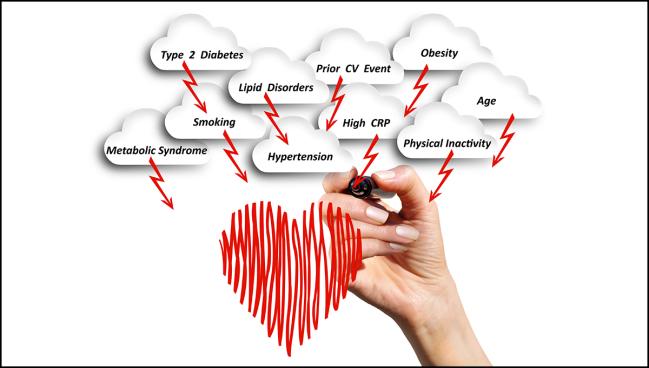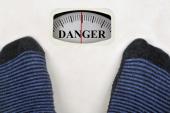CV Risk Factors or Preexisting CVD: What’s Worse for COVID-19?
A new study suggests things like age and diabetes, rather than CVD per se, are driving poor prognosis in COVID-19 patients.

Patients critically ill with COVID-19 who have preexisting cardiovascular disease are more vulnerable to death and CV outcomes than those without this comorbidity, but this increased risk doesn’t appear to be caused by the CVD itself, data from the pandemic’s first wave suggest. Instead, it seems the risk factors leading to the development of CVD, such as age and diabetes, correlate with those driving the severity of COVID-19.
The results, from the STOP-COVID observational study, were published recently online in Circulation: Cardiovascular Quality and Outcomes.
Salim S. Hayek, MD (University of Michigan Frankel Cardiovascular Center, Ann Arbor), one of the investigators, said that their study was inspired by day-to-day practice. As a cardiologist, he often hears from patients: “How does my preexisting heart disease affect my chances, if I were to have COVID? That’s a very common question that everybody gets.”
The STOP-COVID data can be used to help give patients a clearer view of what to expect, Hayek told TCTMD. “I tell patients, ‘Look, COVID and heart disease share the same risk factors. It’s not the fact that you have [heart disease] that means you’re going to get worse COVID, no. You are at risk of COVID, you should get vaccinated, you should watch out—but that’s not related to [your] heart disease. It is related to the fact that you’re a smoker, you have diabetes, and you have high blood pressure. Thus, you might be careful.”
He stressed that it’s important that their results don’t provide false reassurance to patients with CVD: “That’s not the message here.”
STOP-COVID
For STOP-COVID, investigators enrolled 5,133 patients (mean age 61 years; 62.9% male) with COVID-19 who were admitted to the ICU at 68 US hospitals over a 3-month period starting March 1, 2020. After ICU admission, 34.6% of these patients died within 28 days and 17.9% experienced a cardiovascular event (cardiac arrest, new-onset arrhythmia or heart failure, myocarditis, pericarditis, or stroke).
Twenty-three percent had preexisting CVD, a category that spanned coronary artery disease, congestive heart failure, or atrial fibrillation/flutter. These patients tended to be older than those without CVD (mean age 69 vs 58) and more likely to have a history of smoking (54% vs 40%), hypertension (85% vs 55%), diabetes (56% vs 38%), and chronic kidney disease (20% vs 9%).
How does my preexisting heart disease affect my chances, if I were to have COVID? That’s a very common question that everybody gets. Salim S. Hayek
Compared to patients without CVD, those with CVD had higher unadjusted rates of mortality (45.4% vs 31.4%; P< 0.001) and CV events (21.0% vs 17.0%; P = 0.002) at 28 days.
Upon adjustment for age, sex, race, body mass index (BMI), smoking history, and comorbidities, however, the presence of preexisting CVD did not increase the risk of in-hospital mortality within 28 days (OR 1.15; 95% CI 0.98-1.34). Nor was there a link seen for CV events. Results were similar when looking separately at patients with CAD and those with congestive heart failure.
The most important contributors to mortality were age, BMI, smoking, hypertension, and diabetes.
In all, 53.3% of the ICU-admitted patients had at least one troponin measurement within 24 hours of arrival. Testing showed 46.1% had troponin I or T values above the 99th percentile upper reference limit (URL) of normal, indicating myocardial injury. Adjusted for confounders, such injury was associated with increased likelihood of death (OR 1.93; 95% CI 1.61-2.31) and CV events (OR 1.88; 95% CI 1.53-2.32).
“Overall, our findings support the characterization of severe COVID-19 as a pulmonary disease with multiorgan injury related to systemic inflammation,” the researchers conclude. “The occurrence of myocardial injury independently of the presence of CVD and its association with outcomes suggests it is a marker of the severity of the acute illness from COVID-19 rather than exacerbation of preexisting disease.”
Risk Factors, CVD Go ‘Hand in Hand’
Santiago Garcia, MD (Minneapolis Heart Institute, MN, and The Christ Hospital, Cincinnati, OH), whose work with the North American COVID-19 Myocardial Infarction (NACMI) registry has shed light on disease patterns in the pandemic, said the mortality levels associated with SARS-CoV-2 infection seen here are “very consistent” with other reports from the same time period in early 2020. So, too, are the risk factors associated with more-severe COVID-19, he commented to TCTMD.
But Garcia was less convinced by the idea of distinguishing between cardiovascular risk factors and CVD itself.
“The two go hand in hand, so I’m not sure if this is practical in any way,” he said, adding, “A very reasonable person can make a compelling case that somebody who has diabetes already has cardiovascular disease. It’s a coronary artery disease equivalent in many regards. . . . Trying to tease out [the difference] is not of great clinical use, in my mind.”
What’s more compelling, said Garcia, is the “significant, stepwise increase” in mortality with higher troponin. “When there is cardiac damage in this setting, it’s not a good thing,” he commented. “These are sick patients.”
For Hayek, the STOP-COVID results highlight a shared pathophysiologic link—specifically, inflammation—between cardiovascular and respiratory disease. Currently, his group is trying to identify inflammatory markers that might, in turn, be used to predict which patients with COVID-19 are likely to face a more-severe prognosis, he suggested.
Garcia, citing the NACMI database, pointed out that much of what the study documents in terms of mortality and other outcomes is likely out of date, especially with the arrival of vaccines in 2021.
Hayek acknowledged that much has changed in the years since their study period. “The data that we collected here was at the worst of the pandemic,” he said. But it’s reassuring that even then CVD didn’t, in and of itself, worsen COVID-19. Now, when COVID-19 “is much less severe than in the earlier phase of the pandemic,” any potential link between the two diseases would be even weaker, said Hayek.
Caitlin E. Cox is Executive Editor of TCTMD and Associate Director, Editorial Content at the Cardiovascular Research Foundation. She produces the…
Read Full BioSources
Vasbinder A, Meloche C, Azam TU, et al. Relationship between preexisting cardiovascular disease and death and cardiovascular outcomes in critically ill patients with COVID-19. Circ Cardiovasc Qual Outcomes. 2022;15:e008942.
Disclosures
- Hayek reports no relevant conflicts of interest.
- Garcia reports being co-principal investigator of the NACMI registry.





Comments